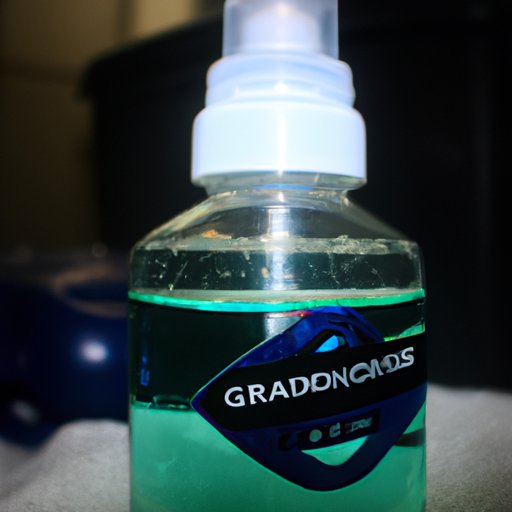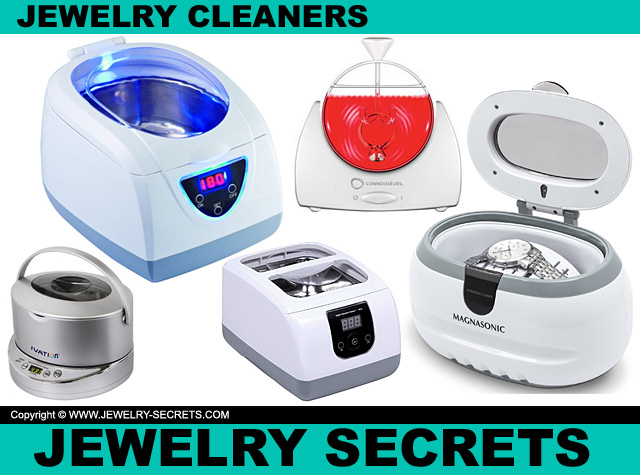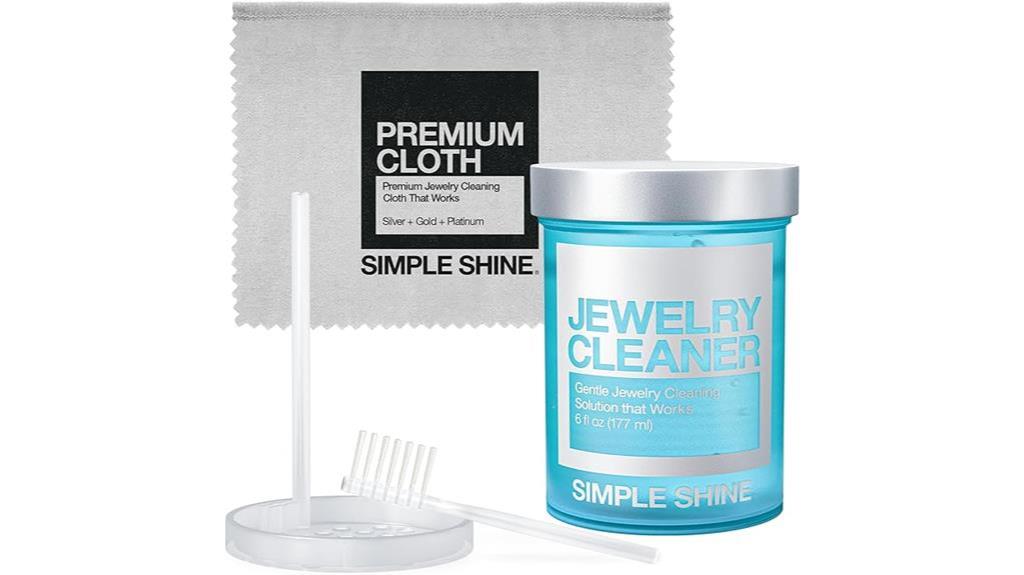The Efficacy Of Jewelry Cleaners: A Comprehensive Guide
The Efficacy of Jewelry Cleaners: A Comprehensive Guide
Related Articles: The Efficacy of Jewelry Cleaners: A Comprehensive Guide
Introduction
In this auspicious occasion, we are delighted to delve into the intriguing topic related to The Efficacy of Jewelry Cleaners: A Comprehensive Guide. Let’s weave interesting information and offer fresh perspectives to the readers.
Table of Content
The Efficacy of Jewelry Cleaners: A Comprehensive Guide
Jewelry, with its intrinsic beauty and sentimental value, deserves proper care to maintain its brilliance and longevity. Over time, exposure to elements like dust, dirt, oil, and even everyday wear can dull the shine and even damage precious metals and gemstones. This is where jewelry cleaners come into play, offering a convenient and effective solution for restoring the luster and sparkle of cherished pieces.
However, the effectiveness of jewelry cleaners is a topic often debated. While some individuals swear by their ability to revitalize tarnished jewelry, others remain skeptical. This comprehensive guide delves into the nuances of jewelry cleaners, examining their benefits, drawbacks, and the factors that contribute to their efficacy.
Understanding the Science Behind Jewelry Cleaning
The effectiveness of jewelry cleaners hinges on their chemical composition and the nature of the jewelry being cleaned. Most cleaners utilize a combination of chemicals designed to break down dirt, grime, and tarnish without damaging the underlying metal or gemstone. Common ingredients include:
- Ammonia: A powerful solvent that dissolves dirt and grease, particularly effective for cleaning silver and platinum.
- Sodium Bicarbonate (Baking Soda): A mild abrasive that gently removes surface grime and tarnish.
- Citric Acid: A natural acid found in citrus fruits, effective for cleaning gold and silver.
- Detergents: Surfactants that help lift dirt and grime from the surface.
Types of Jewelry Cleaners
Jewelry cleaners come in various forms, each tailored to specific cleaning needs:
- Liquid Cleaners: These are readily available in various formulations, suitable for cleaning most jewelry metals. They typically require soaking the jewelry in the solution for a specified duration.
- Ultrasonic Cleaners: These utilize high-frequency sound waves to create cavitation bubbles that dislodge dirt and debris from crevices. They are particularly effective for intricate designs and delicate settings.
- Cleaning Cloths: These are impregnated with cleaning solutions and are ideal for removing fingerprints and light grime from smooth surfaces.
- Polishing Cloths: These are designed to buff out scratches and restore shine to jewelry.
Factors Influencing the Effectiveness of Jewelry Cleaners
Several factors can influence the effectiveness of jewelry cleaners:
- Type of Jewelry: Different metals and gemstones have varying levels of sensitivity to chemicals. For instance, pearls and opals are delicate and should not be cleaned with harsh chemicals.
- Severity of Tarnish: Mild tarnish can be easily removed with a gentle cleaning solution, while severe tarnish may require more aggressive methods.
- Quality of the Cleaner: Reputable brands use high-quality ingredients and formulations that are effective without damaging the jewelry.
- Cleaning Technique: Proper cleaning techniques, such as avoiding excessive soaking or harsh scrubbing, are crucial for preserving the integrity of the jewelry.
Benefits of Using Jewelry Cleaners
- Restoration of Shine: Jewelry cleaners effectively remove dirt, grime, and tarnish, restoring the original brilliance and sparkle to the piece.
- Protection Against Damage: Regular cleaning can help prevent the accumulation of debris that can lead to scratches and wear.
- Increased Longevity: Proper cleaning can extend the lifespan of jewelry by protecting it from damage and preserving its aesthetic appeal.
- Enhanced Value: Clean and well-maintained jewelry can retain its value or even appreciate over time.
Drawbacks of Using Jewelry Cleaners
- Potential Damage: Some cleaners can be harsh and may damage delicate gemstones or finishes if not used correctly.
- Cost: High-quality jewelry cleaners can be expensive, particularly for specialized solutions.
- Environmental Impact: Some cleaners contain chemicals that can be harmful to the environment.
- Limited Effectiveness: Cleaning solutions may not be effective in removing deeply embedded dirt or tarnish.
Tips for Using Jewelry Cleaners Effectively
- Choose the Right Cleaner: Select a cleaner specifically designed for the type of jewelry you are cleaning.
- Read the Instructions: Always follow the manufacturer’s instructions carefully to avoid damaging the jewelry.
- Test on an Unseen Area: Before cleaning an entire piece, test the cleaner on an inconspicuous area to ensure it does not cause any discoloration or damage.
- Avoid Excessive Soaking: Do not soak jewelry for longer than recommended, as this can weaken the metal or loosen gemstones.
- Rinse Thoroughly: After cleaning, rinse the jewelry thoroughly with clean water to remove any residue.
- Dry Completely: Dry the jewelry thoroughly with a soft cloth to prevent water spots or tarnish.
- Store Properly: Store jewelry in a clean, dry environment to prevent dust and grime from accumulating.
FAQs Regarding Jewelry Cleaners
1. Can I use a general purpose cleaner on my jewelry?
No, general purpose cleaners are often too harsh for jewelry and can damage the metal or gemstones. Always use a cleaner specifically designed for jewelry.
2. How often should I clean my jewelry?
The frequency of cleaning depends on how often you wear the jewelry and the environment it is exposed to. As a general rule, it is recommended to clean jewelry every few weeks or as needed.
3. Can I clean my jewelry at home or should I take it to a professional?
You can clean most jewelry at home using a safe and appropriate cleaner. However, for delicate or antique pieces, it is best to consult a professional jeweler.
4. What should I do if my jewelry is severely tarnished?
For severe tarnish, it is best to consult a professional jeweler. They can use specialized cleaning methods to restore the jewelry to its original condition.
5. What are some natural alternatives to jewelry cleaners?
You can use baking soda, lemon juice, and vinegar to clean jewelry. However, these methods may not be as effective as commercial cleaners and should be used with caution.
Conclusion
Jewelry cleaners can be an effective tool for restoring the luster and sparkle of cherished pieces. However, it is important to choose the right cleaner for the type of jewelry and to follow the manufacturer’s instructions carefully. By understanding the benefits, drawbacks, and factors influencing the effectiveness of jewelry cleaners, individuals can make informed decisions about how to best care for their precious possessions. Regular cleaning and proper storage practices contribute significantly to preserving the beauty and value of jewelry, ensuring that these treasured items remain a source of joy and admiration for years to come.
![How to Clean Jewelry [With Infographic] CRATEX](https://www.cratex.com/var/cratex/storage/images/media/images/how-to-clean-jewelry-cratex-infographic/19872-1-eng-US/How-to-Clean-Jewelry-CRATEX-Infographic.png)







Closure
Thus, we hope this article has provided valuable insights into The Efficacy of Jewelry Cleaners: A Comprehensive Guide. We appreciate your attention to our article. See you in our next article!